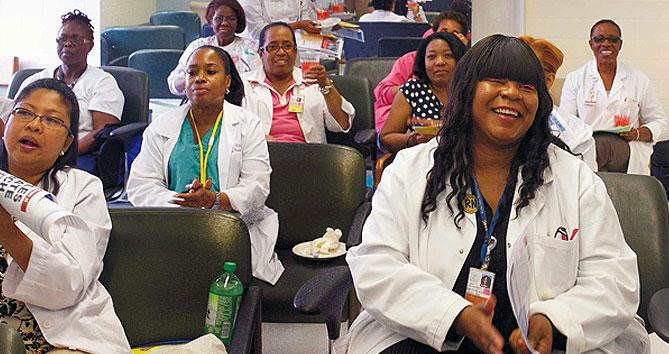Nurses confront climate change head on

It did not take an Extreme Weather Event (EWE) in the form of Super Storm Sandy in 2012 to wake up NYSNA nurses to the serious threat climate change poses to the health of the planet. Still, the deluge at Bellevue Hospital Center, coupled with floods at Coney Island Hospital in Brooklyn, were overwhelming. Nurses have first-hand knowledge of the death, injury and harm climate change brings.
They are adding to that knowledge. At four workshops in the HHC system – Bellevue Hospital Center, Kings County Hospital Center, Jacobi Medical Center and, most recently, at Harlem Hospital Center – hundreds of RNs took part in seminars, fixing their attention on detailed presentations, and showing great interest in the compelling issues that surround climate change.
“Hearing all the human health hazards and the threats facing human beings compels nurses to become advocates for patients and the environment,” said Jackie Gilbert, RN, Harlem Hospital Center.
Nurses see more disease
At the Bellevue workshop, 30 nursing students joined scores of RN staffers. Nurses there acknowledged that the “era of climate change” is no longer a future issue, but upon us.
The purpose of the workshops is reflected in RN understanding that climate change and fossil fuel expansion constitute a global health emergency. Nurses advocating for climate justice is a strong statement to help blunt and reverse global warming.
Confronting energy corporations and their fossil-fuel burning operations and the policies that support these energy enterprises are part of the RN strategic mission.
Nurses are sharing their stark observations: increased rates of asthma, especially among the population of children; heart disease and lung disease; heat-related ailments, especially for the elderly, and cancer.
“We have a lot of patients with asthma – in New York City, with a lot of trucks and heavy traffic,” said Paula Ramsey, RN, a workshop participant at Harlem Hospital. “Due to this, and the climate changes that we have, you find a volume of respiratory problems.”
“Be about it”
They learned at the workshops that carbon monoxide pollution is one of the most serious public health problems in the world. The World Health Organization’s data estimates that about seven million people died as a result of air pollution in 2012. That is one in eight total global deaths. “[A]ir pollution,” wrote the WHO, “is now the world’s largest single environmental health risk.”
Also a topic of discussion: the Keystone XL Pipeline, which would transport one of the world’s dirtiest fuels. Pollutants from tar sands refineries are directly linked to a range of diseases.
Nurses see the need to act.
“Don’t talk about it, be about it,” said Gigi Johnson, RN.
"Nurses can and do make a difference in climate struggle and change for future generations." – Palo Wright, RN
“All the big tycoons, like the Koch brothers, are getting rich off oil and gas. You think about your loved ones, your patients. As RNs, we need to be team players. We need to put our foot to the pedal. I’ll be at the march on September 21.” – Gigi Johnson, RN
“I always knew that this is an issue, but I never thought it could be related to us. I want to learn more, prepare, and volunteer.” – Alex Wong, RN
“We are in a climate crisis. By fighting it, we can have better healthcare for our patients. There’s malaria. There’s cancer. One of the biggest things in New York is asthma. As nurses, we have to be concerned about our communities and our patients.” – Mercedes Bass, RN
“Problems due to climate change are increasing our patient rolls. As nurses, I believe we can bring about change. When it comes to patient care, we have one voice.” – Paula Ramsey, RN